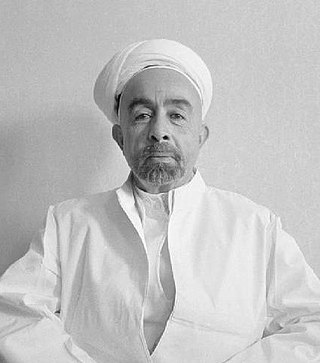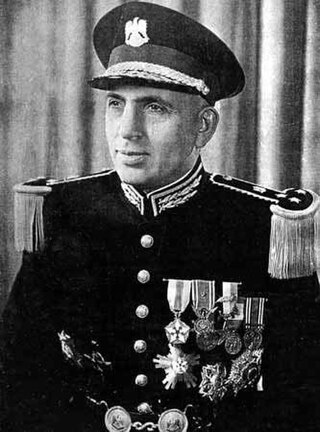Related Research Articles

Faisal I bin Al-Hussein bin Ali Al-Hashemi was King of Iraq from 23 August 1921 until his death in 1933. A member of the Hashemite family, he was a leader of the Great Arab Revolt during the First World War, and ruled as the unrecognized King of the Arab Kingdom of Syria from March to July 1920 when he was expelled by the French.

Abdullah I bin Al-Hussein was the ruler of Jordan from 11 April 1921 until his assassination in 1951. He was the Emir of Transjordan, a British protectorate, until 25 May 1946, after which he was king of an independent Jordan. As a member of the Hashemite dynasty, the royal family of Jordan since 1921, Abdullah was a 38th-generation direct descendant of Muhammad.

Ja'far Pasha al-Askari was an Iraqi politician who served twice as Prime Minister of Iraq in 1923–1924 and again in 1926–1927.

Yasin al-Hashimi, born Yasin Hilmi Salman, was an Iraqi politician who twice served as the prime minister. Like many of Iraq's early leaders, al-Hashimi served as a military officer during Ottoman control of the country. He made his political debut under the government of his predecessor, Jafar al-Askari, and replaced him as prime minister shortly after, in August 1924. Al-Hashimi served for ten months before he was replaced, in turn by Abd al-Muhsin as-Sa'dun. Over the next ten years he filled a variety of governmental positions finally returning to the office of prime minister in March 1935. On 30 October 1936, Hashimi became the first Iraqi prime minister to be deposed in a coup, which was led by General Bakr Sidqi and a coalition of ethnic minorities. Unlike al-Askari, who was then his minister of defense, al-Hashimi survived the coup and made his way to Beirut, Lebanon, where he died three months later. His older brother and close ally, Taha al-Hashimi, served as Prime Minister of Iraq in 1941.

Nuri Pasha al-Said CH was an Iraqi politician during the Mandatory Iraq and the Hashemite Kingdom of Iraq. He held various key cabinet positions and served eight terms as the Prime Minister of Iraq.

The Hashemite Kingdom of Iraq was a state located in the Middle East from 1932 to 1958.

Fawzi al-Qawuqji was a leading Lebanese-born Arab nationalist military figure in the interwar period. The British military were impressed by his military acumen when he served briefly in Palestine in 1936 fighting the British Mandatory suppression of the Palestinian Revolt. A political decision by the British enabled him to flee the country in 1937. He was based in Nazi Germany during World War II, and served as the Arab Liberation Army (ALA) field commander during the 1948 Palestine War.

Adib al-Shishakli was a Syrian military officer who served as President of Syria from 1953 to 1954. He was overthrown and later assassinated.

The Hashemite Arab Federation was a short-lived country that was formed in 1958 from the union between the Hashemite Kingdom of Iraq and Kingdom of Jordan. Although the name implies a federal structure, it was de facto a confederation.

The Franco-Syrian War took place during 1920 between the Hashemite rulers of the newly established Arab Kingdom of Syria and France. During a series of engagements, which climaxed in the Battle of Maysalun, French forces defeated the forces of the Hashemite monarch King Faisal, and his supporters, entering Damascus on July 24, 1920. A new pro-French government was declared in Syria on July 25, headed by 'Alaa al-Din al-Darubi and the region of Syria was eventually divided into several client states under the Mandate for Syria and the Lebanon. The British government, concerned for their position in the new mandate in Iraq, agreed to declare the fugitive Faisal as the new king of Iraq.

The 14 July Revolution, also known as the 1958 Iraqi military coup, was a coup d'état that took place on 14 July 1958 in Iraq which resulted in the toppling of King Faisal II and the overthrow of the Hashemite-led Kingdom of Iraq. The Iraqi Republic established in its wake ended the Hashemite Arab Federation between Iraq and Jordan that had been established just six months earlier.

Egypt–Iraq relations have varied over time, alternating from cooperation to rivalry over time. The modern relationship between Iraq and Egypt soured in 1977 when the two nations broke relations with each other following Egypt's peace accords with Israel. In 1978, Baghdad hosted an Arab League summit that condemned and ostracized Egypt for accepting the Camp David accords. However, Egypt's strong material and diplomatic support for Iraq in its war with Iran led to warmer relations and numerous contacts between senior officials, despite the continued absence of ambassadorial-level representation. Since 1983, Iraq has repeatedly called for the restoration of Egypt's "natural role" among Arab countries. In January 1984, Iraq successfully led Arab efforts within the OIC to restore Egypt's membership.

The Arab Kingdom of Syria was a self-proclaimed, unrecognized constitutional monarchy existing briefly in the territory of historical Syria. It was announced on 5 October 1918 as a fully independent Arab constitutional government with the permission of the British military. It gained de facto independence as an Emirate after the withdrawal of the British forces from OETA East on 26 November 1919, and was proclaimed as a Kingdom on 8 March 1920.

The Iraqi Republic, colloquially known as the First Iraqi Republic, as well as Qasimist Iraq (1958–1963) and Nasserist Iraq (1963–1968), was a state forged in 1958 under the rule of President Muhammad Najib ar-Ruba'i and Prime Minister Abd al-Karim Qasim. ar-Ruba'i and Qasim first came to power through the 14 July Revolution in which the Kingdom of Iraq's Hashemite dynasty was overthrown. As a result, the Kingdom and the Arab Federation were dissolved and the Iraqi republic established. Arab nationalists later took power and overthrew Qasim in the Ramadan Revolution in February 1963, and then Nasserists consolidated their power after another coup in November 1963. The era ended with the Ba'athist rise to power in a coup in July 1968.

The Second Syrian Republic, officially the Syrian Republic from 1950 to 1958 and the Syrian Arab Republic from 1961 to 1963, succeeded the First Syrian Republic that had become de facto independent in April 1946 from the French Mandate. The Second Republic was founded on the Syrian Constitution of 1950, which was suspended from 1953 to 1954 under Adib Shishakli's strongmanship, and later when Syria joined with the Republic of Egypt in forming the United Arab Republic in 1958. The Second Republic resumed when Syria withdrew from the union in 1961. In 1963, the Syrian Ba'athist Party came to power in a bloody military coup, which laid the foundations for the political structure in Syria to the present day.

Abdullah Rimawi was the head of the Ba'ath Party in Jordan in the 1950s. He served as Foreign Affairs Minister in Suleiman Nabulsi's government in 1957. A staunch pan-Arabist, Rimawi became one of the most vocal opponents of the Hashemite ruling family in Jordan and favored union with Syria. He fled Jordan in 1957 as the result of a crisis between the leftist government he was a part of and the royal family. He based himself in the United Arab Republic, where he drew closer to UAR President Gamal Abdel Nasser provoking his expulsion from the Ba'ath Party—which was at odds with Nasser—in 1959. Soon after he founded a splinter party called the Arab Socialist Revolutionary Ba'ath Party. During his exile, he allegedly made a number of attempts to attack or undermine the Jordanian monarchy.

The 17 July Revolution was a bloodless coup in Iraq in 1968 led by Ahmed Hassan al-Bakr, Abd ar-Razzaq an-Naif, and Abd ar-Rahman al-Dawud that ousted President Abdul Rahman Arif and Prime Minister Tahir Yahya and brought the Iraqi Regional Branch of the Arab Socialist Ba'ath Party to power. Ba'athists involved in the coup as well as the subsequent purge of the moderate faction led by Naif included Hardan al-Tikriti, Salih Mahdi Ammash, and Saddam Hussein, the future President of Iraq. The coup was primarily directed against Yahya, an outspoken Nasserist who exploited the political crisis created by the June 1967 Six-Day War to push Arif's moderate government to nationalize the Western-owned Iraq Petroleum Company (IPC) in order to use Iraq's "oil as a weapon in the battle against Israel." Full nationalization of the IPC did not occur until 1972, under the Ba'athist administration. In the aftermath of the coup, the new Iraqi government consolidated power by denouncing alleged American and Israeli machinations, publicly executing 14 people including 9 Iraqi Jews on fabricated espionage charges amidst a broader purge, and working to expand Iraq's traditionally close relations with the Soviet Union.
This is a timeline of major events in the history of the modern state of Jordan.

Ali Abu Nuwar was a Jordanian army officer, serving as chief of staff in May 1956 – April 1957. He participated in the 1948 Arab–Israeli War as an artillery officer in the Jordanian army's predecessor, the Arab Legion, but his vocal opposition to British influence in Jordan led to his virtual exile to Paris as military attaché in 1952. There, he forged close ties with Jordanian crown prince Hussein, who promoted Abu Nuwar after his accession to the throne.